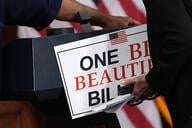You have /5 articles left.
Sign up for a free account or log in.
The Foundation for Individual Rights in Education’s attempt to end “the generation-long scandal of campus speech codes” by helping to file free-speech lawsuits against a number of colleges and universities has so far resulted in more than $200,000 in settlements.
The lawsuits are part of a campaign – called the Stand Up for Speech Litigation Project -- that began in July with litigation against Chicago State University, Citrus College, Iowa State University and Ohio University. FIRE had previously brought lawsuits against Modesto Junior College and the University of Hawaii at Hilo for blocking students from passing out copies of the Constitution, and those suits were also folded into the campaign. The project has since grown to include Western Michigan University.
"More cases are in the works,” said Catherine Sevcenko, FIRE’s associate director of litigation. “We will continue to work with colleges and universities that reach out to us, as we have for the last 15 years. But colleges and universities need to understand that when we filed four lawsuits in one day last July, it was not a publicity stunt.”
In December, Citrus College settled its lawsuit by revising its free speech policy and paying a student $110,000 in court fees and damages. The student alleged that the college threatened to kick him off campus for discussing a petition while outside Citrus College’s “free speech zone” -- an area, FIRE said, that accounts for just 1.37 percent of the campus.
The college was already forced to eliminate such zones after a separate FIRE lawsuit in 2003.
“The college later reinstated its speech quarantine when it thought no one was watching,” said Greg Lukianoff, FIRE’s president.
In a statement, the Citrus Community College District said it will expand the college’s free speech zone to include “most open spaces on campus.” It maintains that its original policies were constitutional, and that the college agreed to the settlement only to avoid a costly lawsuit.
“Freedom of expression is crucial in the higher education community, and the district and its Board of Trustees have done much to protect and advance this cherished right,” the college stated. “The challenged policies were written in compliance with a long line of U.S. Supreme Court cases relating to speech activities in public places, including college campuses.”
As part of their settlements, the University of Hawaii at Hilo and Modesto Junior College also agreed to revise their free speech policies to allow free speech zones in open areas across campus. The institutions agreed to pay $50,000 each in damages and legal fees.
While these three cases were settled, FIRE is facing a bigger challenge in litigating murkier cases like those against Iowa State and Ohio University.
The Ohio lawsuit alleges that the university ordered members of Students Defending Students, a group that helps students accused of campus misconduct, to stop wearing shirts featuring the slogan “We get you off for free." The university said that it never directed any students not to wear the T-shirts, however, turning the lawsuit into a case of “he said, she said.”
Another T-shirt fracas led to the lawsuit at Iowa State, where students and FIRE allege that administrators manipulated the university’s trademark policy to not allow the continued use of the ISU cardinal mascot on a shirt designed by the campus chapter of the National Organization for the Reform of Marijuana Laws. The university argues that the case is not about free speech, but about whether “Iowa State University should retain the right to administer its own trademarks.”
On those grounds, the university motioned to dismiss the lawsuit, but an Iowa federal judge rejected the request in January, saying that “no infringement is involved in the case at hand.” It’s the first time a judge has ruled in any of the cases brought by FIRE’s litigation project. The case will now go to trial in December.
Sevcenko said FIRE will continue to bring more lawsuits this year, but there’s no set timetable for when new cases will be announced (the original goal was to sue another college for every lawsuit that was completed). At least nine schools, she said, have already revised some of their speech codes in response to the project.
“One of Stand Up for Free Speech’s broader goals is to change the calculus of college administrators to realize that not respecting the First Amendment rights of students and faculty carries a high monetary and reputational cost,” she said. “We have strong indications that our message is being heard.”




